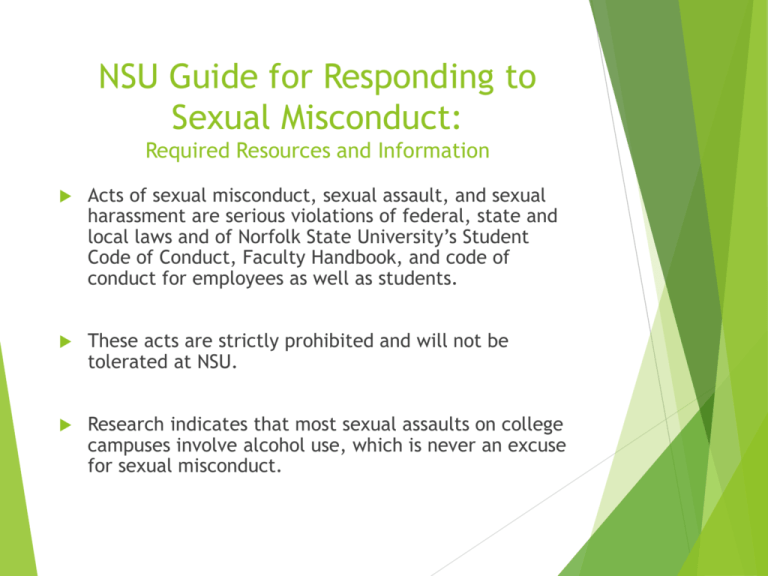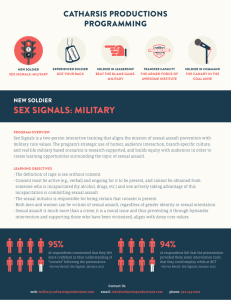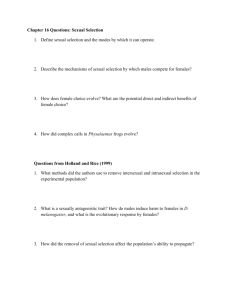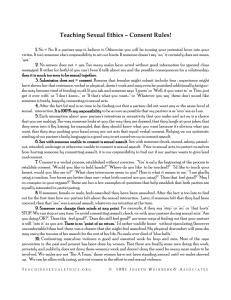
NSU Guide for Responding to
Sexual Misconduct:
Required Resources and Information
Acts of sexual misconduct, sexual assault, and sexual
harassment are serious violations of federal, state and
local laws and of Norfolk State University’s Student
Code of Conduct, Faculty Handbook, and code of
conduct for employees as well as students.
These acts are strictly prohibited and will not be
tolerated at NSU.
Research indicates that most sexual assaults on college
campuses involve alcohol use, which is never an excuse
for sexual misconduct.
What College Students Need
to Know About Sexual Assault
Objectives of this On-line
Training Module
To understand what constitutes sexual misconduct,
sexual assault; its risks and devastating effects;
To understand parameters of local, state and federal
law and University policy relative to sexual assault;
To learn how to respond to and support survivors and/or
victims of sexual assault;
To become aware of campus and community resources
that are available to survivors and/or victims.
The Problem
Notalone.gov. White House website on sexual assault
http://www.whitehouse.gov/1is2many
1 in 5
YOUNG WOMEN WILL BE A VICTIM OF SEXUAL ASSAULT WHILE THEY
ARE IN COLLEGE
1 in 9
TEEN GIRLS WILL BE FORCED TO HAVE SEX
1 in 10
TEENS WILL BE HURT ON PURPOSE BY SOMEONE THEY ARE DATING
1 IS 2 MANY.
The Problem (CONTINUED)
One in four women will be raped in her lifetime;
One in seven men will be sexually assaulted in his
lifetime;
Rape and sexual assault are among the least
reported crimes.
What is Sexual Misconduct?
Sexual misconduct includes a wide-range of behaviors
that include sexual assault and rape, sexual
harassment, dating and domestic violence, stalking, and
any other conduct of a sexual nature that is nonconsensual, or that has the potential to harm, threaten,
intimidate, pressure or coerce an individual. Both men
and women are protected from sexual misconduct.
In addition to non-consensual sexual contact, sexual
misconduct includes, but is not limited to, threatening
speech, participation in making or distributing
photographs, video, or other visual or auditory
recordings of a sexual nature.
Effect of Sexual Assault on
Victims
Chances of developing rape trauma syndrome (i.e.,
post-traumatic stress disorder) after being raped are
between 50 and 95%;
After a rape, victims are 10 times more likely to abuse
drugs and 14 times more likely to have significant
alcohol dependencies. Additional effects may include:
Anxiety
Distorted Self-Image
Powerlessness
Depression
Perseverance
Withdrawal
Disorganization
Self-Blame
What Should I do if I am
Sexually Assaulted?
First, get to a safe place.
If you are in danger or in need of urgent medical attention, call 911
or call Norfolk State University Police at 757-823-8102.
Even if you are not injured, you still need medical assistance to
protect your health.
The NSU Counseling Center or the YWCA Crisis Intervention Services
can offer you guidance, support, and can accompany you to receive
medical assistance to protect your health. Medical assistance will
be provided a nurse examiner who can a safe and caring
environment.
THE NSU COUNSELING CENTER – 757-823-8173
THE YWCA COUNSELING CENTER – 757-625-4248
THE YWCA CRISIS HOTLINE – 757-226-9922
What to do if I am Sexually
Assaulted (continued)
To protect evidence, it is important that you do not shower,
brush your teeth, put on make-up, eat, drink, or change
your clothes until advised to do so.
You are encouraged to report the crime to University law
enforcement or to a local police for criminal investigation.
NSU Police 757-823-8102
911
If you feel uncomfortable reporting the crime, consider
calling a confidential counseling resource (NSU Counseling
Center or the YWCA Crisis Hotline) where you may discuss
your concerns and questions regarding the assault and the
reporting process.
You are also encouraged to report the crime or incident to
the NSU Title IX Coordinator who will further ensure your
safety and provide other forms of support (757-823-8160)
Where to Refer Victims of Sexual
Assault
The following campus and off-campus resources are
immediately available and FREE OF CHARGE to anyone who
may need or desire counseling or advocacy related to past
or present sexual assault trauma. Any person requiring
immediate assistance should contact one of the offices
below:
THE NSU COUNSELING CENTER – 757-823-8173
THE YWCA COUNSELING CENTER – 757-625-4248
THE YWCA CRISIS HOTLINE – 757-226-9922
THE NSU POLICE DEPARTMENT – 757-823-8102
THE NSU TITLE IX COORDINATOR – 757-823-8160
What is the difference between
Sexual Assault and Sexual Harassment?
(https://www.notalone.gov/)
Sexual Assault is a crime. Sexual assault is defined as
intentional sexual contact, characterized by use of
force, threats, intimidation or abuse of authority, or
when the victim does not or cannot consent.
Sexual assault includes rape, forcible sodomy (oral or
anal sex), and other unwanted sexual contact that is
aggravated, abusive, or wrongful (including unwanted
and inappropriate sexual contact) or attempts to
commits these acts.
Sexual harassment is a form of gender discrimination
that involves unwelcome sexual advances, requests for
sexual favors, and other verbal or physical conduct of a
sexual nature. For more information on sexual
harassment.
What is Dating and Domestic
Violence?
(https://www.notalone.gov/)
Domestic and dating violence: Domestic and dating
violence is broadly defined as physically, sexually,
and/or emotionally abusive behaviors used by one
individual to assert power or maintain control over
another in the context of an intimate or family
relationship.
What is Stalking?
Stalking is defined as engaging in a course of conduct that
would cause a reasonable person to fear for his or her safety
or the safety of another person or causing emotional
distress.
Examples:
Sending unwanted or non-consensual communications
(letters, telephone calls, voice mails, e-mail messages, text
messages);
Showing up repeatedly and unexpectedly;
Sending unwanted gifts;
Making threatening or obscene gestures;
Pursuing or following; surveillance or other observation,
trespassing, vandalism, and non-consensual touching.
Cyber-stalking is a form of stalking or harassment that
involves the Internet to cause someone emotional distress.
What is Consent?
Only “Yes means Yes and only an explicit ‘yes’ can be considered
consent (California Senate Bill 967; Kimmel & Steinhem, 2014).”
All forms of sexual activity require consent between the
participants (prior to any sexual activity).
Consent is defined as VOLUNTARY, POSITIVE AND MUTUAL
AGREEMENT, as well as CLEAR COMMUNICATION, UNDERSTANDING
AND PERMISSION to engage in any form of sexual activity with a
person or persons legally capable of providing consent.
Sexual activity with a minor is unlawful with or without consent.
Sexual activity with a person who is intoxicated or incapacitated
mentally, emotionally, or physically is unlawful with or without
consent.
Passively allowing someone to touch you in a sexual manner is not
consent. Forcing or manipulating someone into having sex is not
consent. Prior relationships or prior consent to any one form of
sexual activity cannot automatically imply consent to any other
forms of sexual activity. Consent, even when given, can be
withdrawn at any time.
“Yes means Yes. Only an explicit ‘yes’ can be considered consent.”
Rights of Sexual Assault
Victims/Survivors
To be treated with respect, dignity, understanding and
professionalism.
To receive available resources, confidential counseling, medical
care, guidance, advocacy, safety and other support services;
To have your case or concerns fully investigated as desired by
campus administrators and/or by law enforcement;
To receive academic accommodations (e.g., receiving extensions
on assignments or additional academic support after an assault or
due to the lingering effects of violence);
To receive housing accommodations (e.g., moving an accused
rapist or offender out of your dormitory);
To receive employment accommodations (e.g., modifying your
work schedule to prevent interaction with offender or attacker);
To receive campus restraining orders (“no-contact directives”).
CONFIDENTIAL REPORTING
LOCATIONS (on-campus and off-campus)
If you desire complete confidentiality, contact one of the
following offices for FREE AND CONFIDENTIAL ASSISTANCE:
The NSU Counseling Center (757-823-8173);
The Response Sexual Assault Support Services of the
YWCA Hotline (757-226-9922);
The Response Sexual Assault Support Services of the
YWCA Counseling Services (757-625-4248);
The NSU Spartan Health Center (757-747-7607).
On-Campus Services:
The NSU Counseling Center
FREE AND CONFIDENTIAL COUNSELING SERVICES;
LOCATED ON CAMPUS;
24-HOUR ON-CALL SERVICES;
ACCOMPANIMENT SERVICES for FORENSIC COLLECTION
EXAMS, EMERGENCY ROOM VISITS, LEGAL AND COURT
PROCEEDINGS;
Phone: 757-823-8173
Off-Campus Services: THE YWCA
OF SOUTHHAMPTON ROADS
RESPONSE Sexual Assault Crisis Services of the YWCA offers:
FREE AND CONFIDENTIAL SERVICES;
LOCATED OFF-CAMPUS;
24-HOUR CRISIS HOTLINE 757-226-9922;
ACCOMPANIMENT SERVICES: FORENSIC COLLECTION
EXAMS, EMERGENCY ROOM VISITS, LEGAL AND COURT
PROCEEDINGS;
COUNSELING SERVICES (757-625-4248);
Located: 5215 Colley Avenue, Norfolk, Virginia 23508
Medical Care: Rape
Treatment Centers
Nurse Examiner: Victims can receive a FREE and
CONFIDENTIAL medical rape exam at a nearby hospital. A
nurse examiner can provide contraception and
treatment for sexually transmitted disease.
If an individual wishes to pursue an examination, it is
necessary to do so within 72 hours of the rape.
Hospitals that provide the rape exam:
Norfolk General Hospital (757-388-3000)
Chesapeake General Hospital (757-312-8121), which works
in conjunction with Chesapeake Forensics (757-547-2322 or
398-5105).
Preserving Evidence
Guidelines for Preserving Evidence:
It is important for a victim/survivor of rape to
observe the following guidelines if possible:
Do not destroy evidence by showering, douching,
washing clothes or linen, or washing hands, but doing
so does not disqualify a victim from an examination.
Additionally, a victim/survivor of rape might wish to
put his or her unwashed clothes in a paper bag to be
used as evidence.
Sexual Assault, Alcohol and Drug
Use:
A person who is asleep or mentally or physically
incapacitated, either through the effect of drugs or
alcohol or for any other reason, is not capable of giving
valid consent.
Therefore, any intercourse with an individual who is
intoxicated or incapable of consenting amounts to rape.
The use of alcohol or drugs may seriously interfere with
the participants' judgment about whether consent has
been sought and given.
Amnesty
The University encourages the reporting of all violations
and crimes. The University realizes, however, that students
are sometimes hesitant to report such conduct, as they
fear that they themselves may receive sanctions. To create
a culture of reporting, the University does not charge
students with minor violations. Amnesty is granted on the
following occasions:
When a student is a victim of misconduct;
When a student offers assistance to others in need;
When a student brings a drug/alcohol dependency issue to the
attention of a University official for assistance;
The University may impose educational options as opposed
to sanctions in such cases, at the discretion of the student
conduct officer.
Virginia Law
Sexual assault, relationship violence, and stalking are
recognized by the Commonwealth of Virginia as serious
crimes. Victims of criminal sexual assaults are encouraged
to contact police and pursue criminal charges.
The Norfolk State University Police Department, or local
police, can walk individuals through their options,
including a criminal and civil investigation (757-8238102 or 911).
Local Police: Victims have the option of calling 911 or
contacting local police directly.
Anonymous Reporting: Sexual assaults can also be
reported anonymously to the NSU Police Department
by calling 757-823-2148.
NSU Title IX Coordinator
The NSU Title IX Coordinator oversees grievance
procedures and policy relative to the effective handling
of sexual assaults and all gender equity issues;
The Title IX Coordinator is available to meet with
students, faculty and staff;
The Title IX Coordinator is located in the Department of
Human Resources (Wilson Hall, Suite 210)
Phone: 757 823-8160
How to help Victims of Sexual
Assault
Encourage the victim to get immediate assistance. Help by
encouraging reporting of the crime or incident to the NSU
Counseling Center, to the YWCA Crisis hotline, to NSU
Police, to the NSU Title IX Coordinator or by calling 911;
Listen to the victim and take the allegations seriously and
make no judgments about the victim or the alleged
perpetrator;
Accompany the victim to the NSU Counseling Center or NSU
Police Department, etc.
Support the victim and show respect by maintaining
confidentiality.
Evaluation: Please provide written
responses to the following questions:
1.
Define the different types of sexual assault or sexual
misconduct.
2.
Describe the scope of the problem (trends and statistics
in sexual assaults).
3.
Describe resources that are available to victims.
4.
What is confidential reporting?
5.
1.
Identify additional reporting options available to sexual
assault victims.
2.
Why is it important for a victim of sexual assault to receive
medical care?
Identify the rights of victims.
(continued)
EVALUATION OF FOLLOWING
SCENARIO:
Use the following scenario to answer Question 6
Amanda and Bill meet at a party. They spend the evening
dancing and getting to know each other. Bill convinces Amanda
to come up to his room. From 11:00pm until 3:00am, Bill uses
every line he can think of to convince Amanda to have sex with
him, but she adamantly refuses. He keeps at her and begins to
question her religious convictions and accuses her of being “a
prude.” Finally, it seems to Bill that her resolve is weakening,
and he convinces her to give him a "hand job" (hand to genital
contact). Amanda would never have done it but for Bill's
incessant advances. He feels that he successfully seduced her
and that she wanted to do it all along but was playing shy and
hard to get. Why else would she have come up to his room
alone after the party? If she really didn't want it, she could
have left. Please answer questions on the following slide:
Bill and Amanda: Evaluation of
Scenario
Question 6: Based on the scenario regarding Amanda and Bill
meeting at a party, please answer the following questions.
6a. Review the definition of “sexual assault” and summarize
the definition in writing.
6b. Review the definition of “consent” and summarize it in
writing.
6c. Explain if this is, or is not a case of sexual assault based
on the definitions of consent and sexual assault.
Please follow instructions from your professor to submit
written responses to all questions!
Response to Scenario
Bill would likely be responsible for violating the
university Non-Consensual or Forced Sexual Contact
policy. It is likely that a university hearing board
would find that the degree and duration of the
pressure Bill applied to Amanda are unreasonable. Bill
coerced Amanda into performing unwanted sexual
touching upon him. Where sexual activity is coerced,
it is forced. Consent is not effective when forced. Sex
without effective consent is sexual misconduct.
References
Statistics and information regarding trends in sexual
assaults are from various studies and sources that
include, but are not limited to, the U.S. Department of
Justice, Office of Violence Against Women, the National
Center for Higher Education Risk Management, the
Center for Disease Control, and the White House
website on Sexual Assaults (2009-2014).







